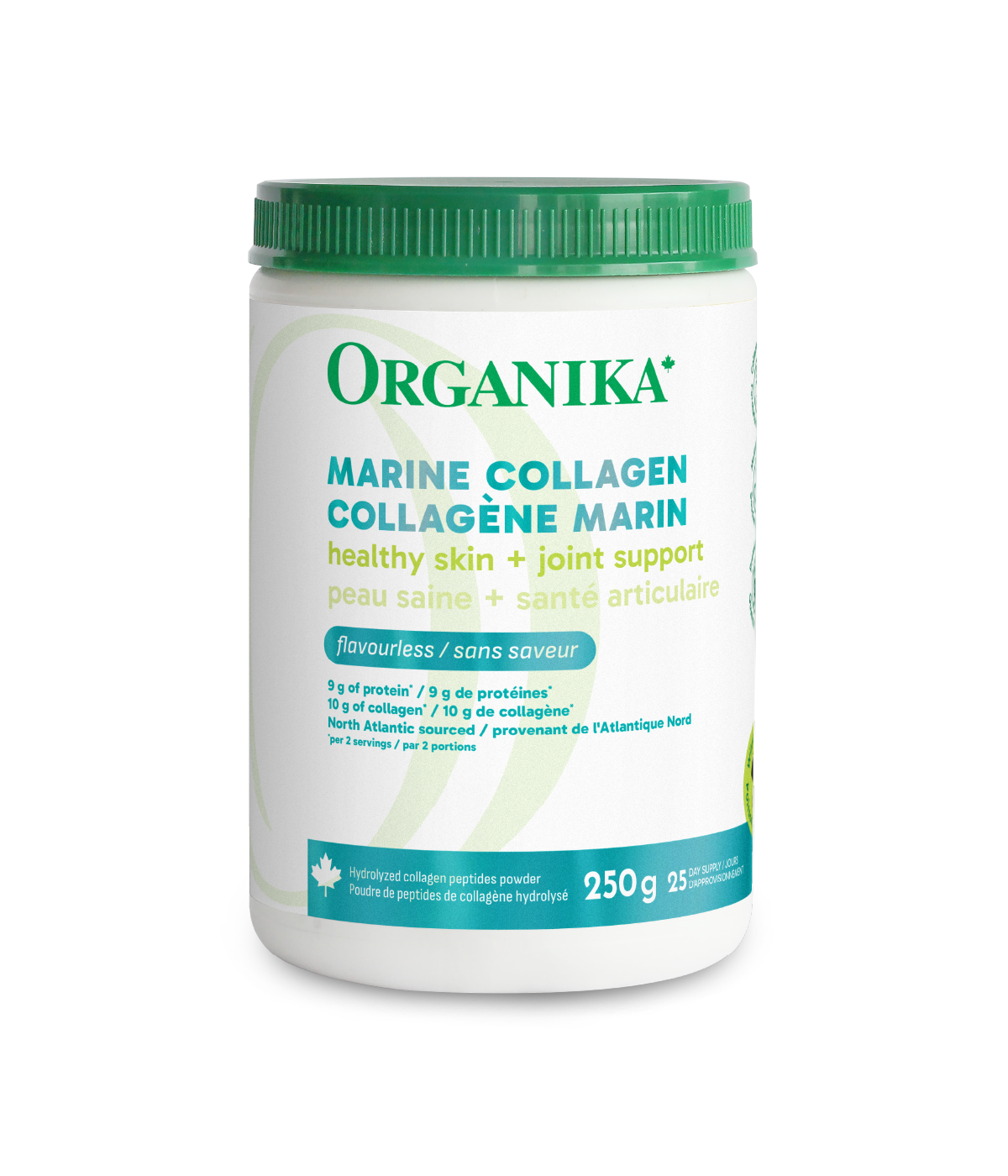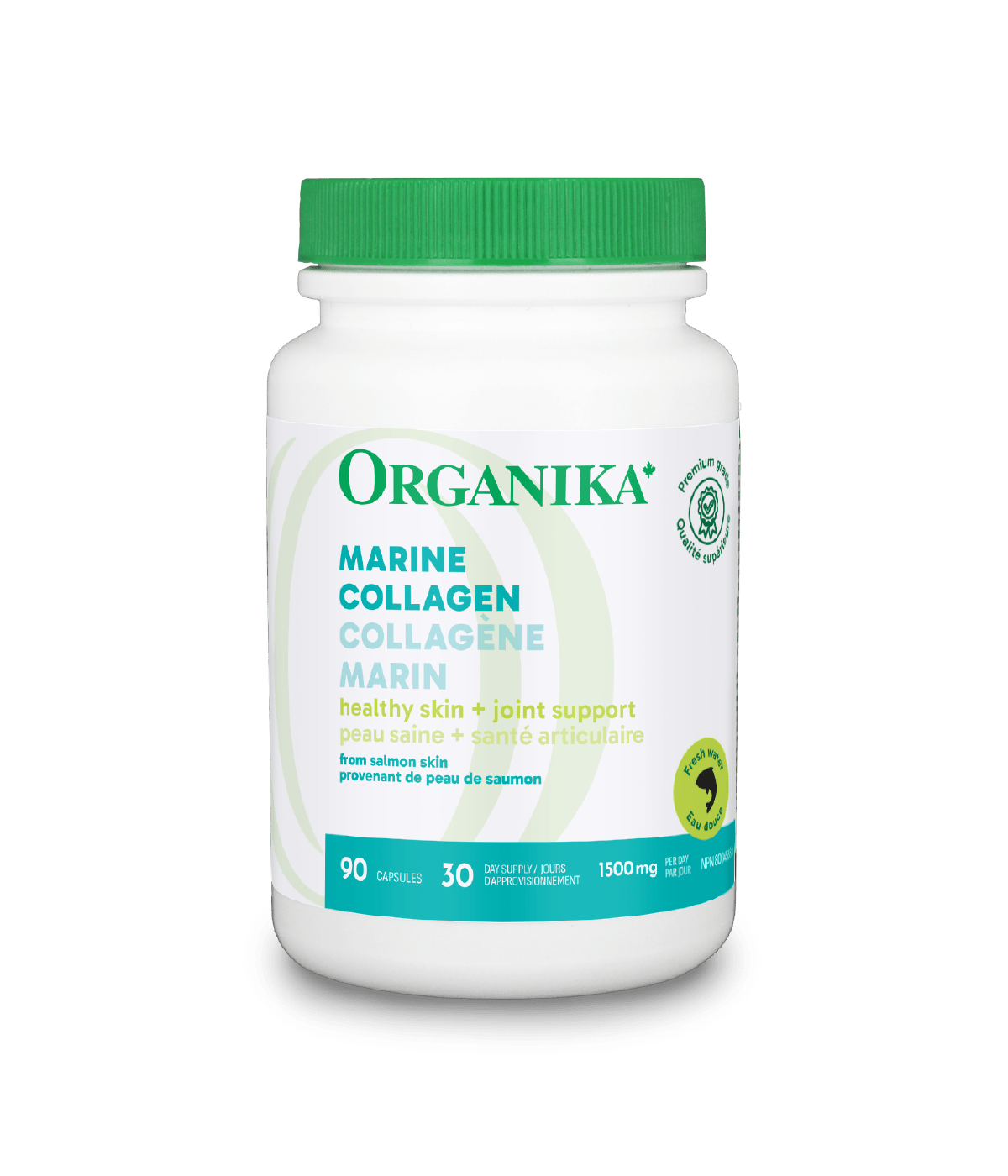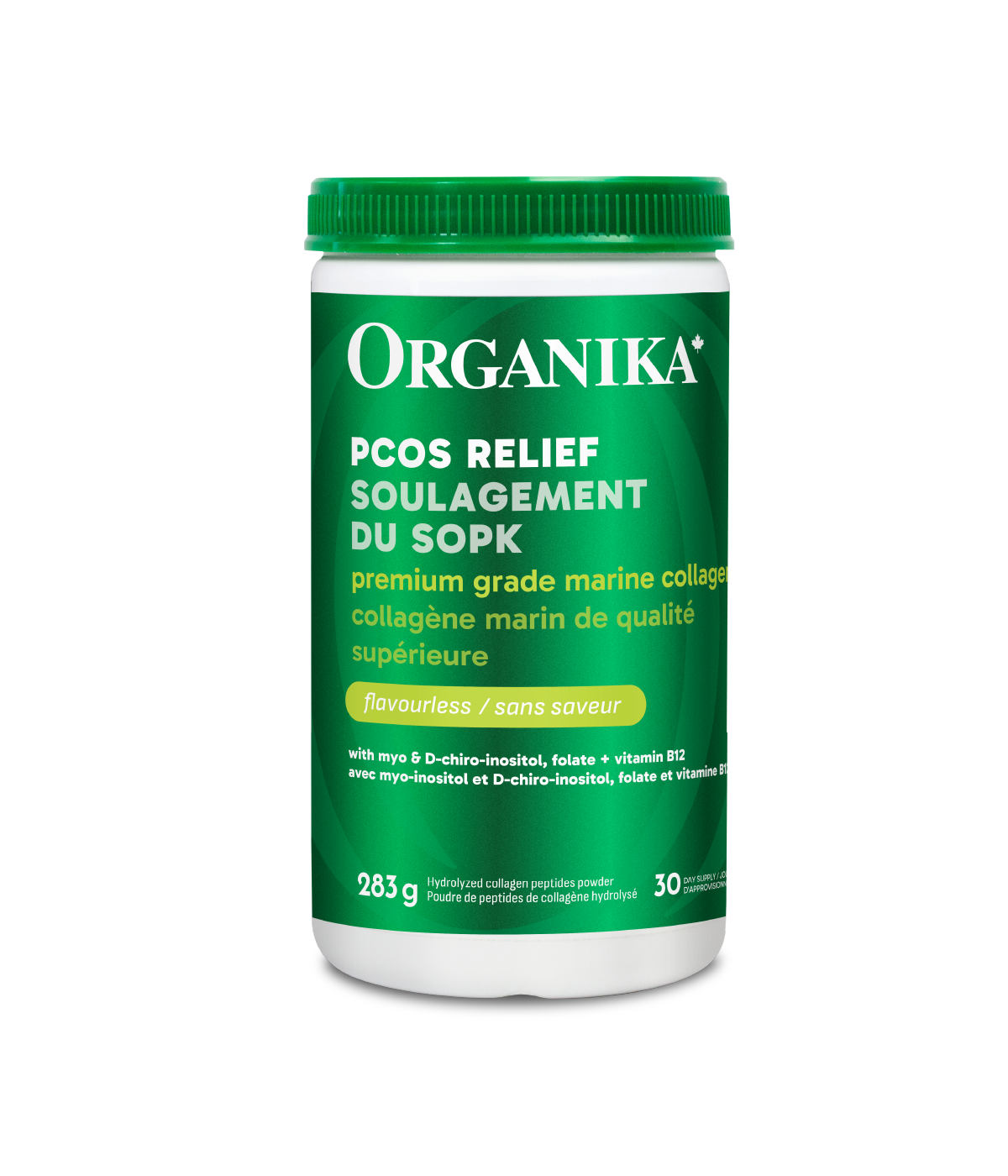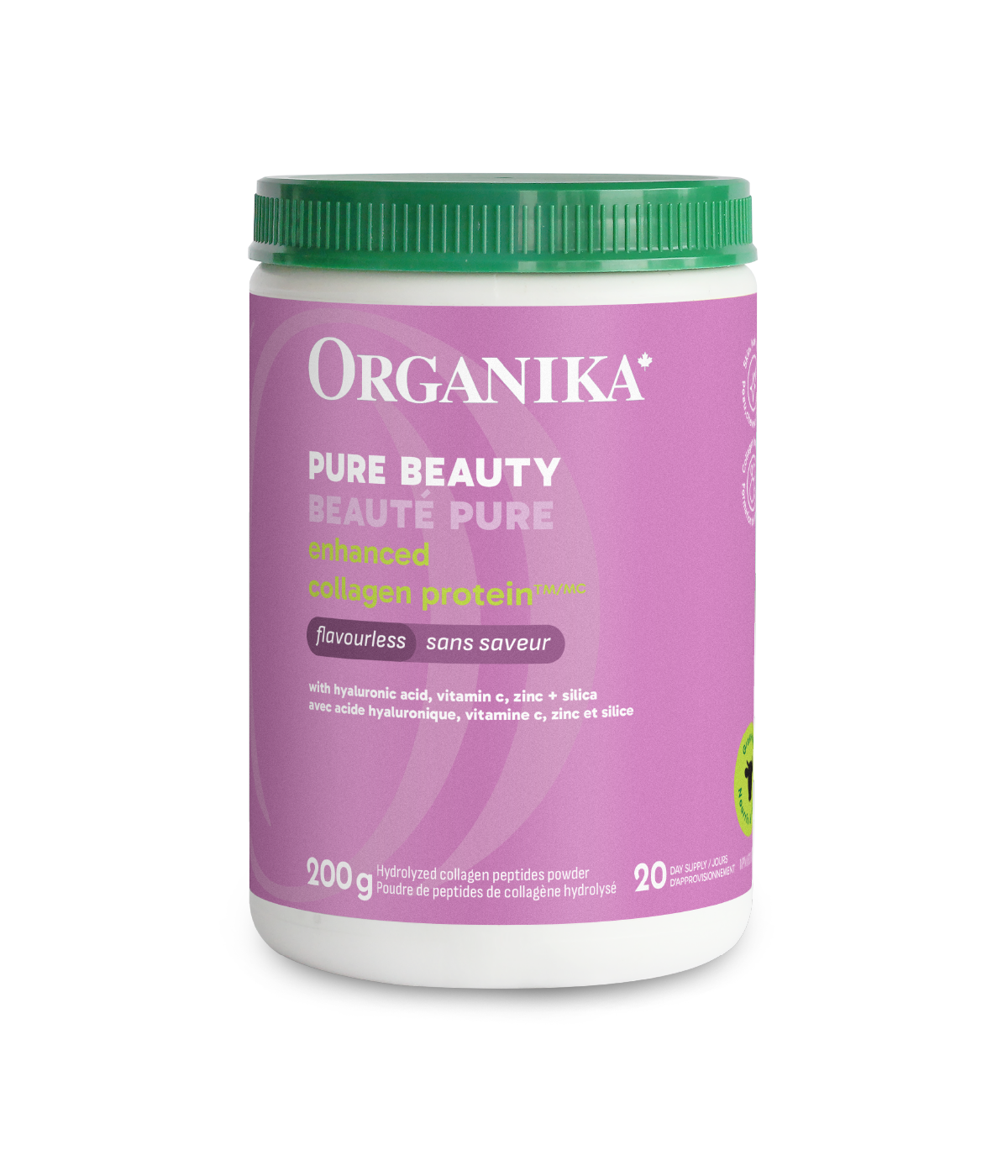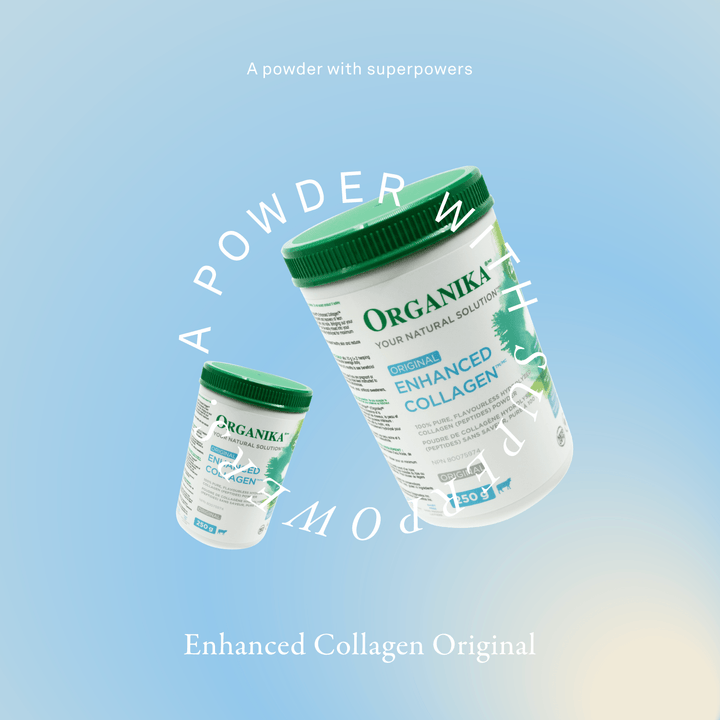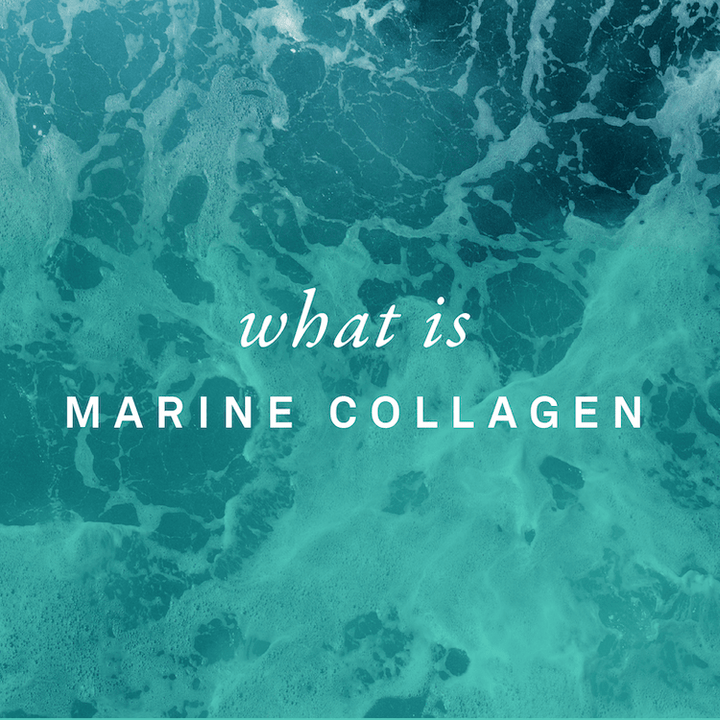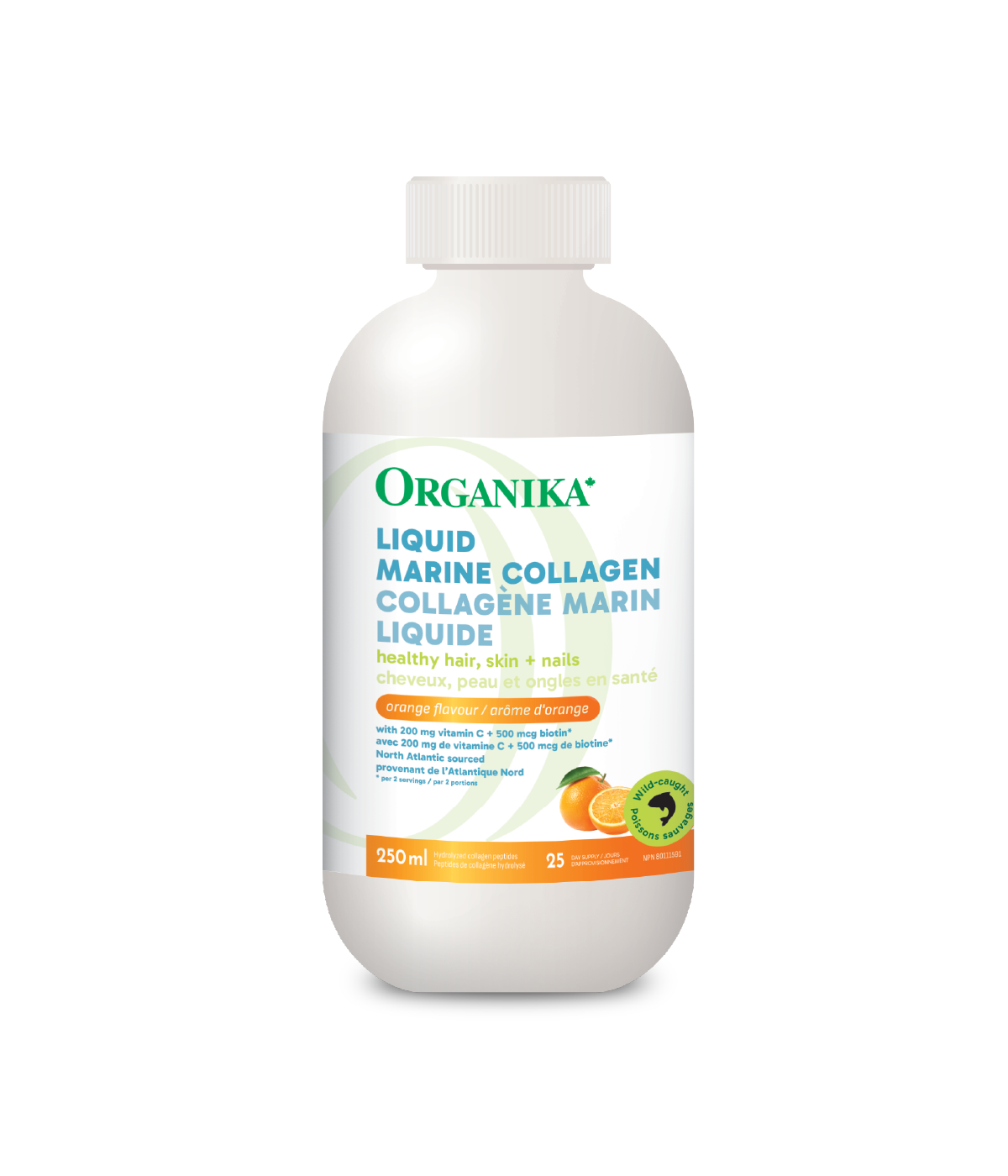
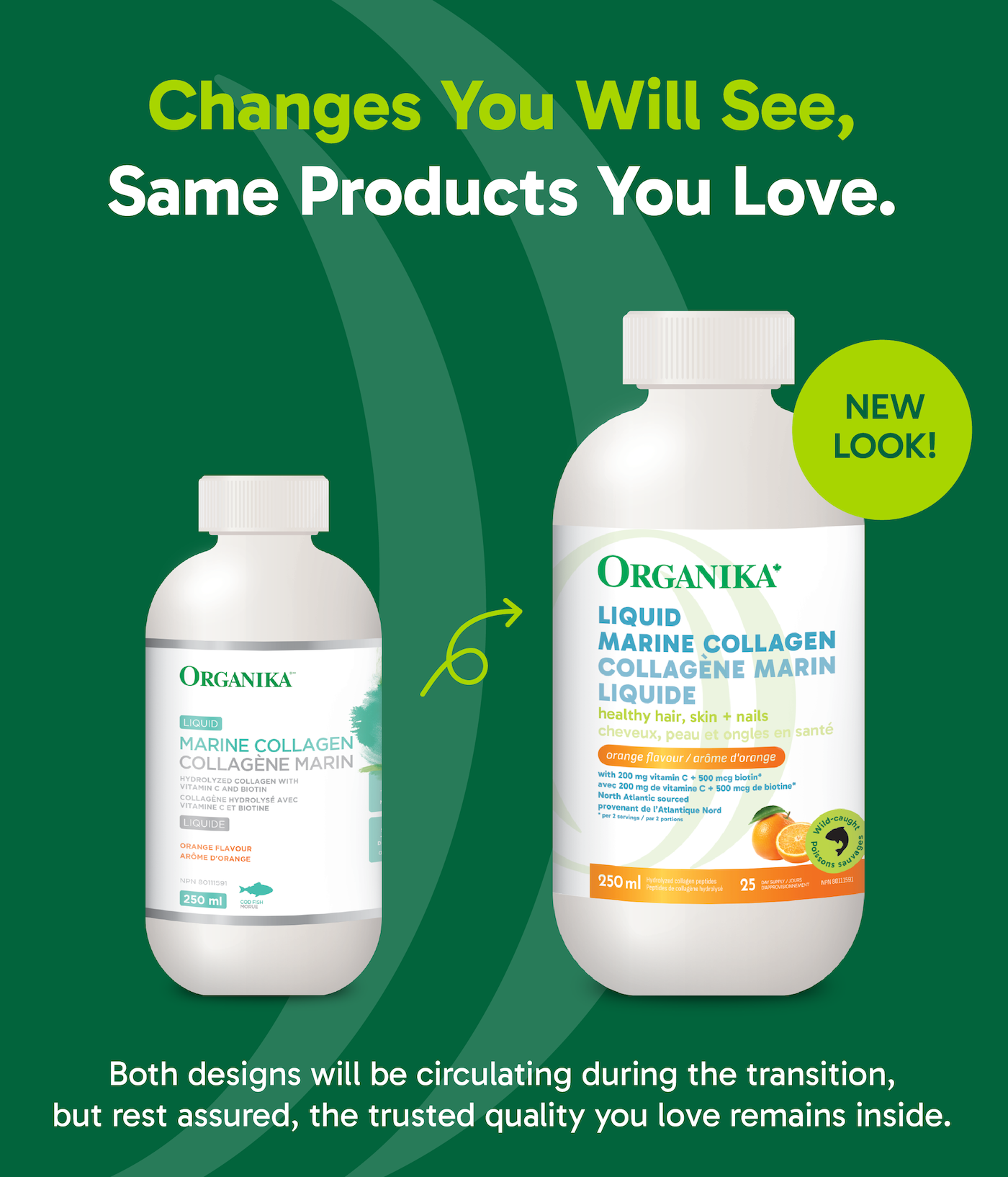
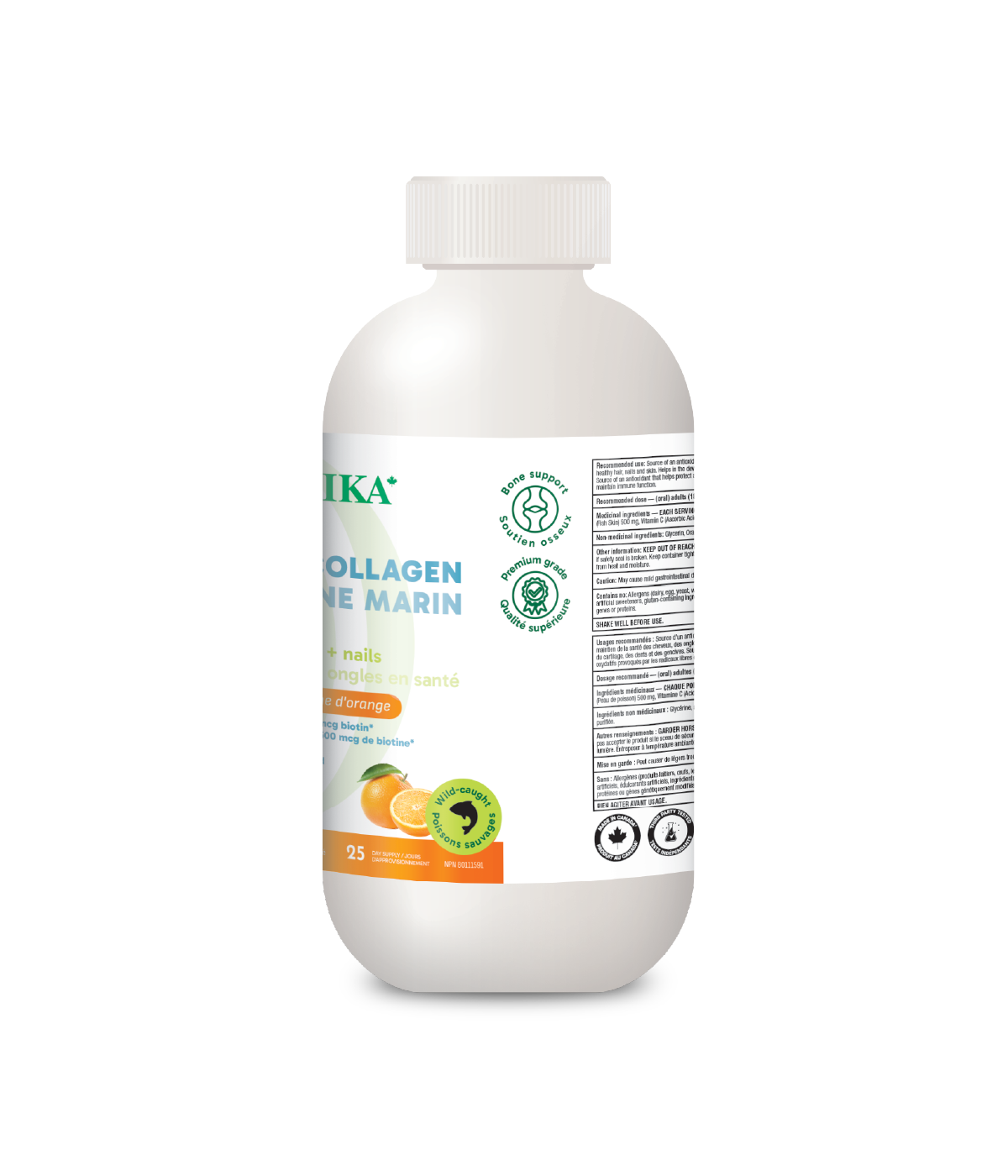
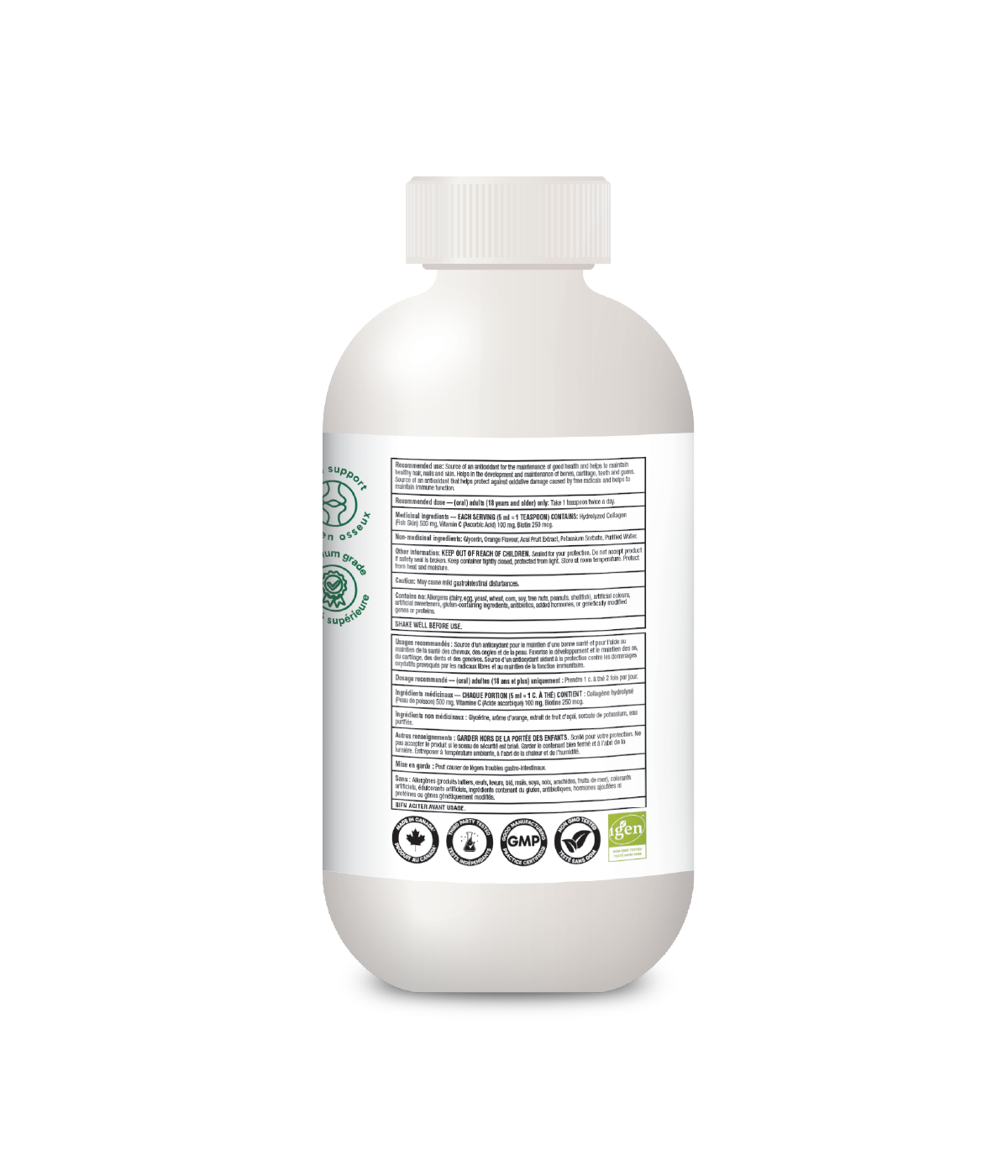
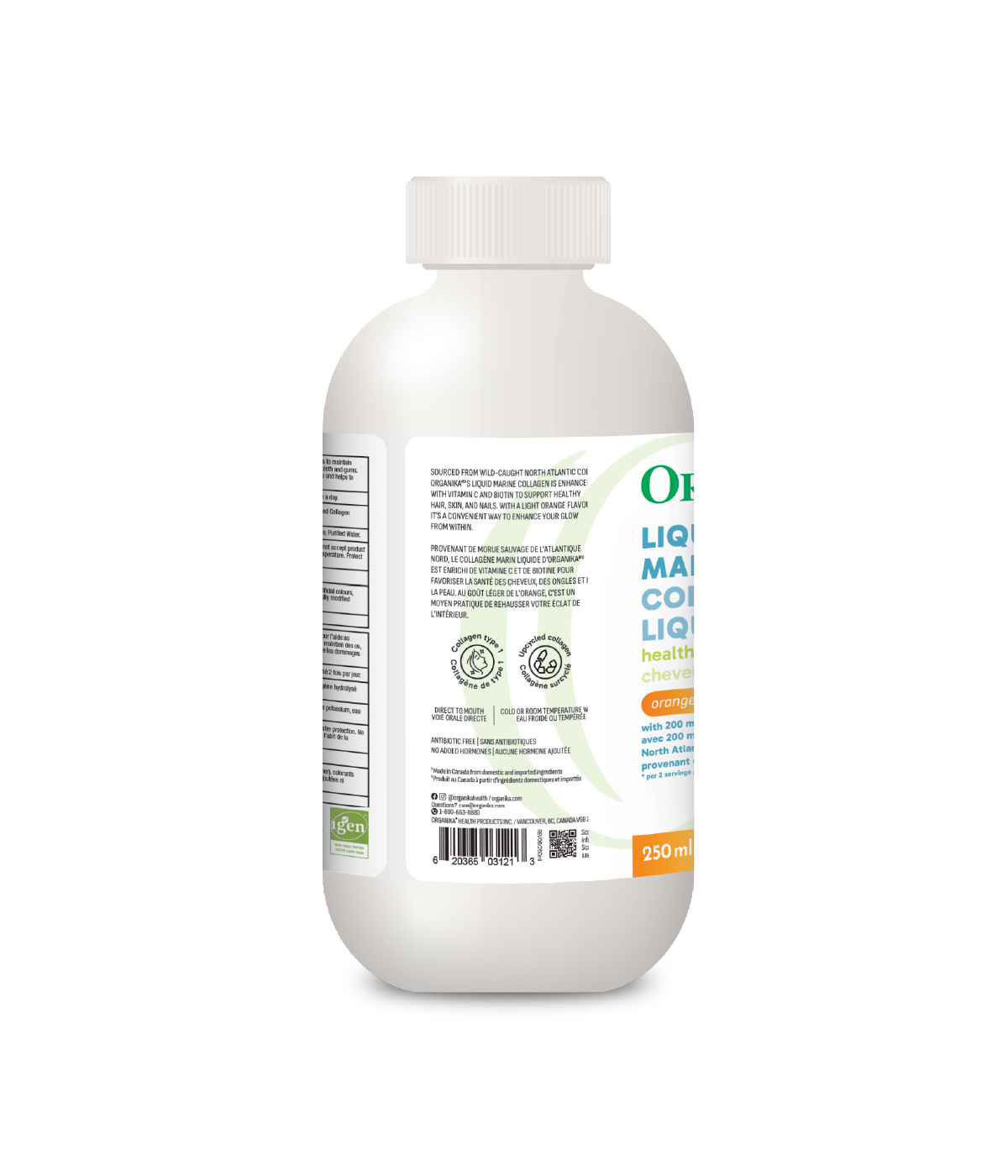




-
Is this right for you?

-


-


-

-

-

-

Liquid Marine Collagen
A liquid alternative to bovine collagen with wild-caught ingredients that smooth skin and strengthen nails.
- Promotes healthy skin, hair, and nails
- Vitamin C to support collagen production and Biotin for added beauty benefits
- Helps reduce joint pain linked to osteoarthritis
- No mixing, tasty orange flavoured liquid that's easy to take daily
Couldn't load pickup availability



Notify Me When Available
Enter your email and we'll let you know as soon as this product is back
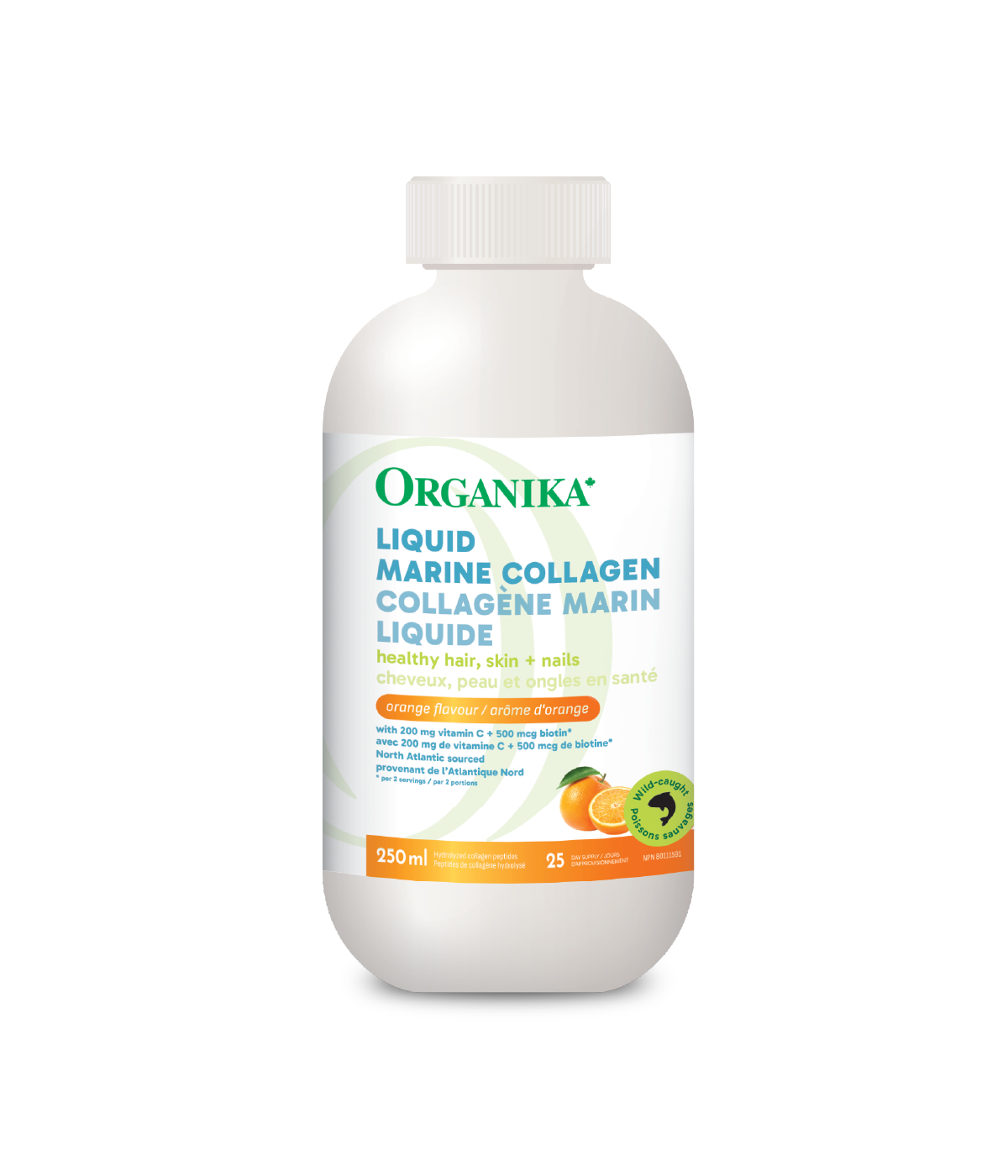

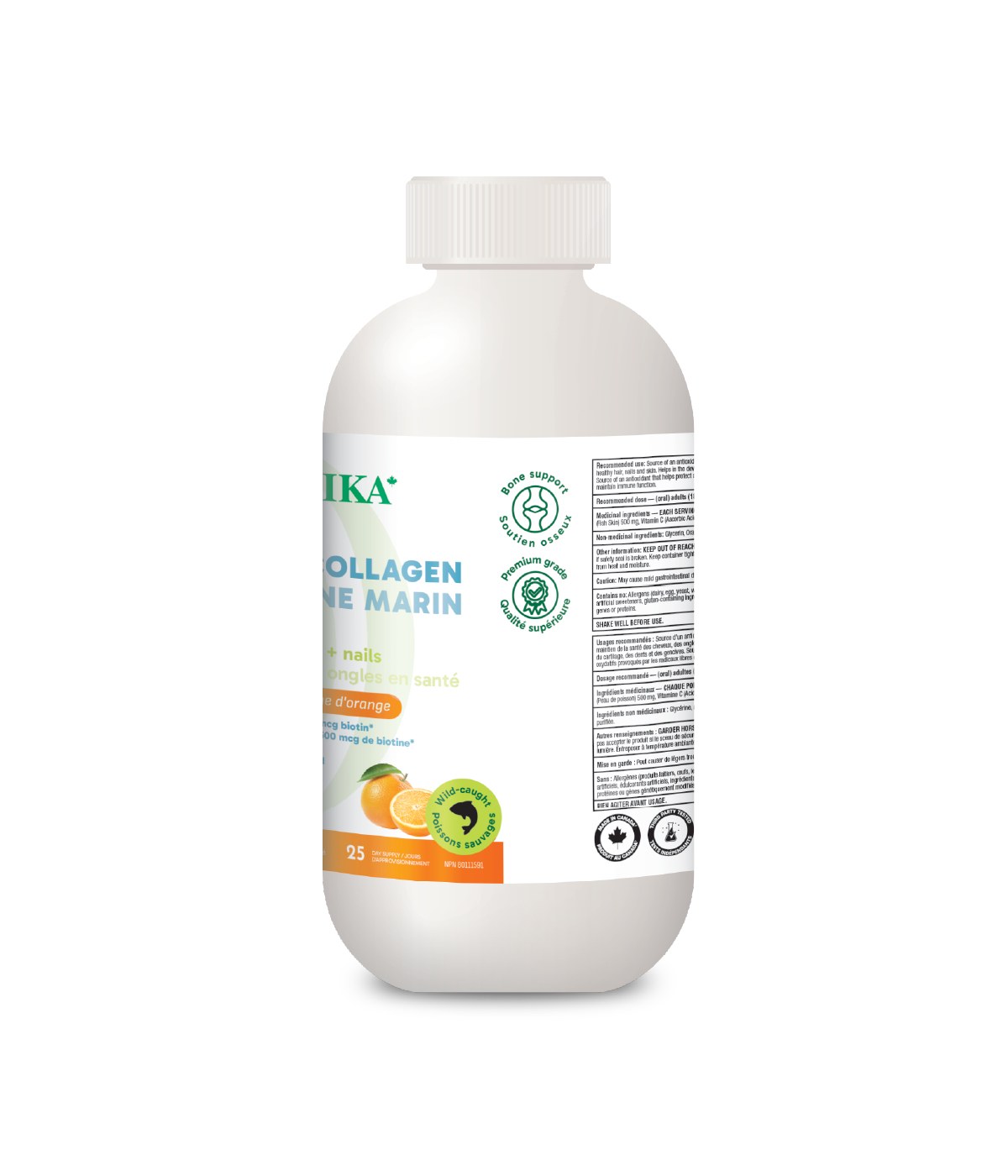
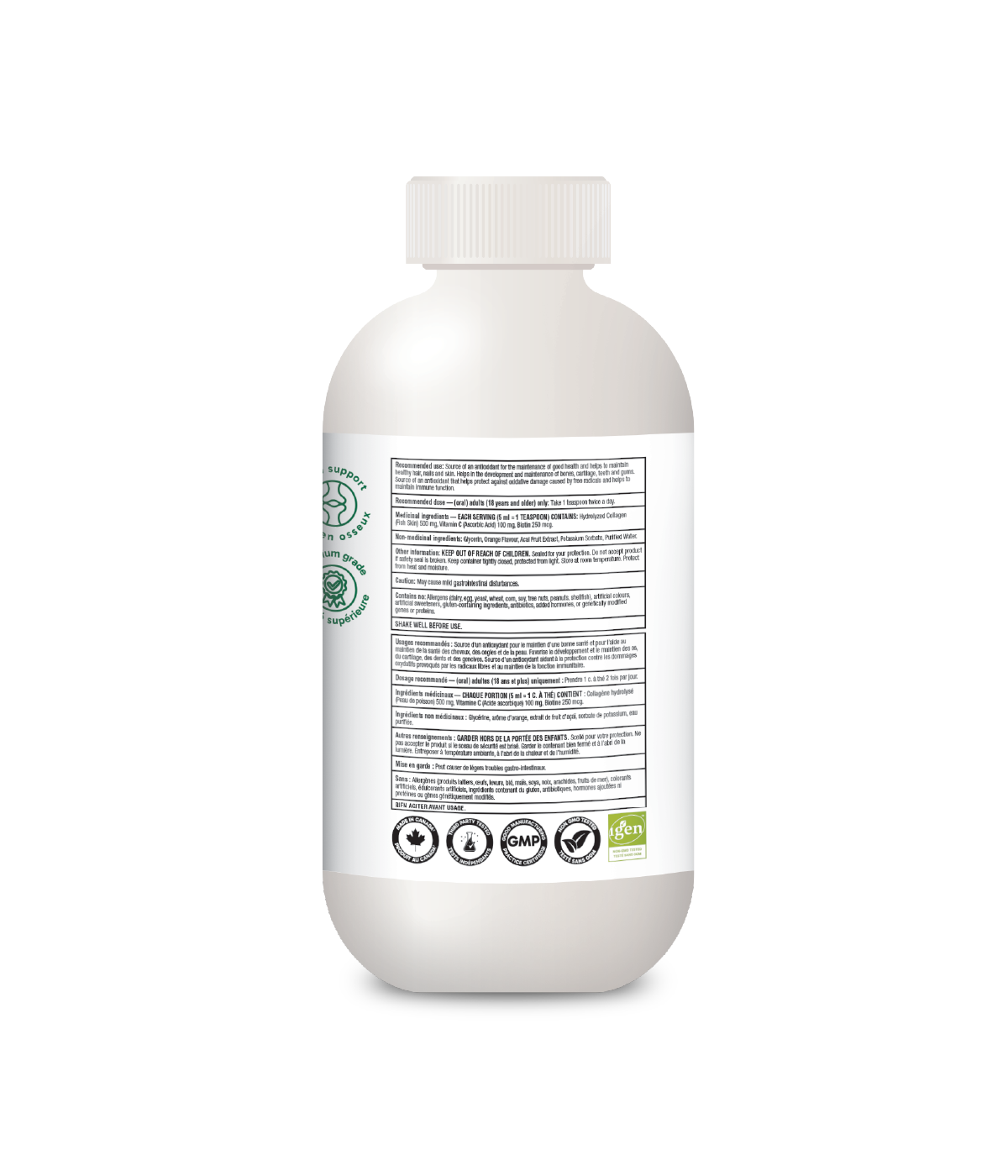
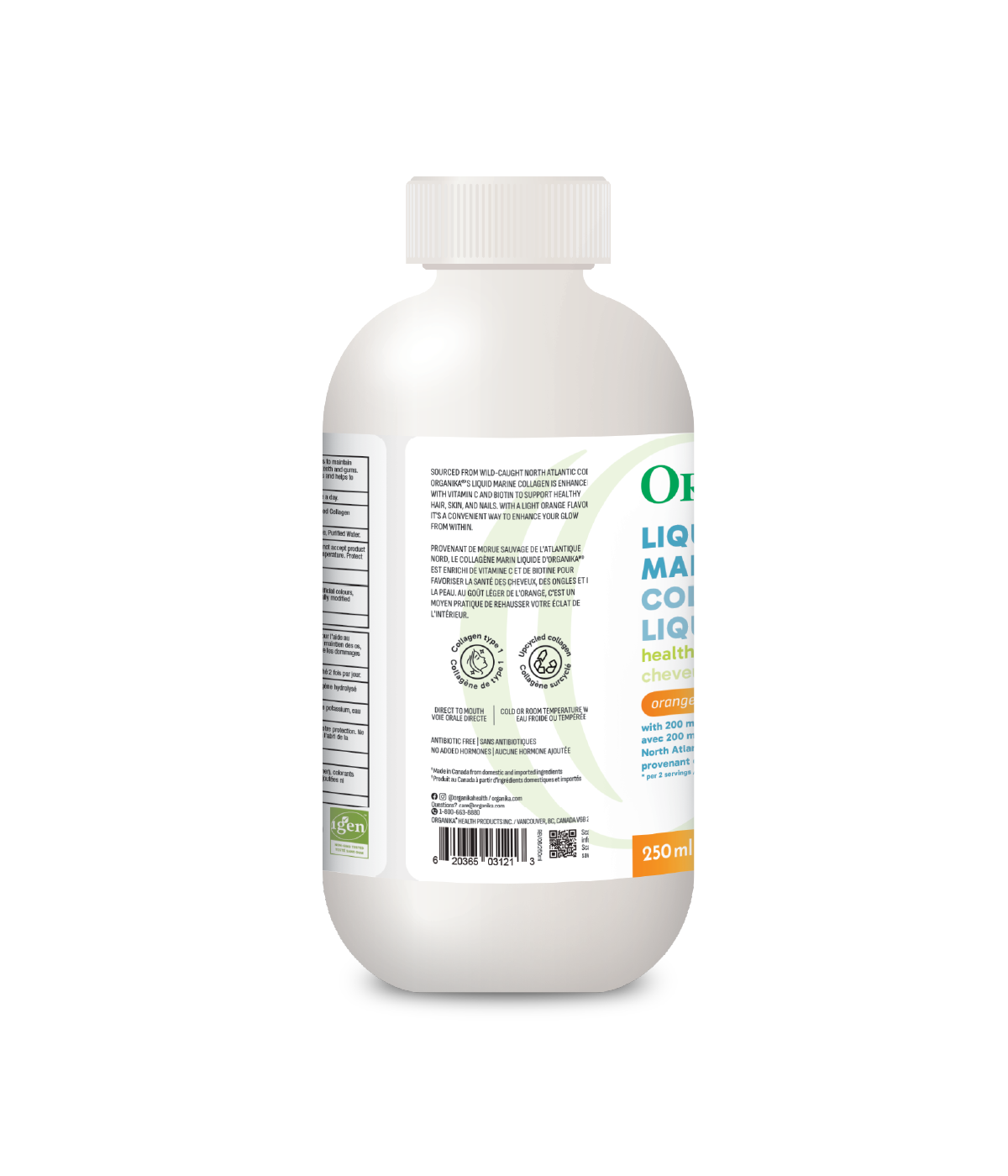





Supplement Facts





Ingredients & Nutrition
MEDICINAL INGREDIENTS - EACH TEASPOON (5 ml) CONTAINS: Hydrolyzed Collagen (Fish skin) 500 mg, Vitamin C (Ascorbic Acid) 100 mg, Biotin 250 mcg.
NON-MEDICINAL INGREDIENTS: Glycerin, Orange Flavour, Acai Fruit Extract, Potassium Sorbate, Purified Water.
How to Use: Take one tsp (5ml) twice a day directly into mouth or added to water.
Is This Right for You?
Looking for a collagen alternative to bovine?
Are you in search of a collagen sourced from sustainable wild-caught North Atlantic Cod?
Do you prefer liquid collagen?
If you answered "Yes" to any of the above, this product is right for you.

-
Helps reduce joint pain linked to osteoarthritis
-
No mixing, tasty orange flavoured liquid that's easy to take daily
Ingredients & Nutrition
Recommend For
Looking for a collagen alternative to bovine?
Are you in search of a collagen sourced from sustainable wild-caught North Atlantic Cod?
Do you prefer liquid collagen?
If you answered "Yes" to any of the above, this product is right for you.
Gluten-Free
Keto Friendly
Non-GMO
No Artificial Sweeteners
No Artificial Colours or Flavours
Sustainably sourced from wild marine life, this bovine-free collagen delivers essential support for healthy joints, radiant skin and strong hair and nails


The Full Scoop

-
Helps reduce joint pain linked to osteoarthritis
-
No mixing, tasty orange flavoured liquid that's easy to take daily
The liquid answer to smooth skin, strong nails and resilient joints. Our liquid marine collagen is made with 1000 mg of sustainably sourced hydrolyzed collagen from wild-caught North Atlantic cod, then paired with 200 mg of Vitamin C to support collagen formation and 500 mcg of Biotin to help maintain healthy hair, skin and nails. It's a well-rounded daily formulation for beauty and mobility with added peace of mind.
Ask Away
We’ve got the FAQs covered. But if you’re still stuck, we’re only a message away.
Get in TouchDoes this product contain any allergens?
Liquid Marine Collagen is free of dairy, soy, gluten, peanuts, tree nuts, sesame, shellfish, sulphites, and mustard. It is manufactured in a facility that also produces food items containing fish, soy, corn, and coconut.
Does this product contain artificial ingredients?
Liquid Marine Collagen is free of preservatives, artificial colours.
What type of collagen does this product contain?
This product features marine collagen containing collagen type 1.
Do I have to keep in the refrigerator after opening?
No, this product is shelf stable.
What is Potassium Sorbate?
Potassium sorbate is a preservative widely used in food and beverage products.
What type of sweetener is used?
Liquid Marine Collagen is free from sweeteners; however it does contain glycerin which imparts a mild sweet taste.
How does the liquid compare to the powder for bioavailability?
Liquid collagen is digested and absorbed into the bloodstream more quickly and efficiently than powder. We absorb 90% of the liquid collagen vs. 30% of the powder collagen.
Can I put the liquid Marine collagen into a hot beverage?
Heat wonít affect the collagen potency; however the product is designed with flavor (orange) and tastes delicious even on its own.
What type of fish are used?
Liquid Marine Collagen is sourced from wild-caught Cod.
You'll Likely Also Love...
Marine Collagen Powder
An ocean-based alternative to bovine collagen esepcially key for healthy skin, hair and nails
Marine Collagen Capsules
An ocean-based alternative to bovine collagen especially key for healthy skin, hair and nails—in capsule form
Marine Collagen PCOS Relief
A collagen that helps relieve PCOS symptoms and supports balanced hormones
Enhanced Collagen Protein Pure Beauty
A collagen blend with added beauty benefits for healthier skin, hair and nails
Support Beyond Products
Even though collagen seems like a household name these days, many people are still unsure if they should take collagen, or what it can do for them. There are many questions you still have about collagen before it's time to pick up your first bottle, so we want to clear that up! To help you decide if collagen is for you, we’re answering the top 10 things you need to know about collagen: 1. What is collagen? Collagen is a protein, and is what makes up a lot of what is found in our hair, skin and nails. It is referred to as the “glue” that holds our body together. As we get older, however, we're unable to produce the necessary collagen to prevent the signs of aging. This is why many people will supplement with it. 2. Are there negative side effects of taking collagen? For most people, there are no side effects of taking collagen. Most people find that adding collagen to their routine has positive outcomes for their digestive health, hair, skin and nails. However, in rare instances, some people have noticed small breakouts, or light digestive distress when adding collagen to their diet. There has been no definitive correlation between collagen and these issues. 3. How long does it take to see results from taking collagen? There are a few factors that matter here: how long you take it, and what your lifestyle is already like. Generally it can take up to four months to truly see the benefits of collagen in your body. If you are eating a poor diet that lacks the nutrients your body needs to produce its own collagen, and start taking a maximum dose each day, then you may see the effects quite quickly. However if you eat quite healthy and add in about 1 serving per day (approximately 10g), it may take a few more weeks to see the extra glow. 4. Do I need to take collagen every day? It is suggested that you consume around 1 tbsp. of collagen everyday. If you are looking for more therapeutic benefits taking 2-3 tbsps. each day will provide more nourishing, and possibly faster acting effects. As our collagen production starts to reduce with age, taking it regularly will be beneficial for more long-term health effects. 5. Should I take collagen on an empty stomach? Our best suggestion to taking collagen: take it whenever, and however it works best for you! Many people will add it to their morning cup of coffee, while others like it in a pre-bed elixir to help promote a more restful sleep. While some people swear by taking it at a specific time each day, there is no evidence to show that timing matters. So take it whenever works for you! 6. Are there different types of collagen? Yes! You can learn more about the types of collagen here. But we’ll give you the Cole's Notes version now: There are many types of collagen in your body (articles cite anywhere from 15-27 different types of collagen). However, there are three types that are of most importance in our body: Type 1, Type 2, and Type 3. Pretty easy to remember, right? Type 1 collagen is what helps our hair, skin and nails, and can be found in Organika’s Enhanced Collagen, Marine Collagen and Salmon Collagen. Type 2 collagen is found in Organika’s Chicken Bone Broth and BioCell Collagen supplements, and supports joint health. People living with joint issues, like osteoarthritis may find relief from using supplements rich in Type 2 collagen. Type 3 collagen is usually found alongside Type 1 collagen in your body and is an important component of our bone marrow. This is available in Organika's Enhanced Collagen line. 7. Can I make collagen on my own? Your body naturally produces collagen using Vitamin C, and the amino acids, glycine, proline and lysine. This means that yes, if you are eating a primarily plant-based diet, you can still produce the collagen necessary to keep your skin glowing and your hair flowing. However, it is important to remember that our collagen production decreases as we age. That’s likely because our body can’t breakdown and absorb the proper nutrients to create it (like these amino acids and Vitamin C). So including a collagen supplement, or a plant-based booster is helpful! 8. Is collagen just a powder? Collagen can come in various forms, but you’ll usually see it in a powder or capsule form. For example, our Marine Collagen and Enhanced Collagen line are powders that can be added to smoothies, baking, or your morning coffee/tea. Our Plant-Based Collagen Booster is also a powder, however it’s best to use that in cold liquids to ensure you keep the integrity of the vitamins. On the other hand, you can also use Organika’s BioCell Collagen or Salmon Collagen, which both come in capsule form. 9. Can I take different types of collagen at the same time? You can! In fact, Organika even sells a product that includes all three types of collagen in one convenient powder called Full Spectrum Collagen. 10. Can I add hydrolyzed collagen to hot foods or liquids? The process of hydrolyzation means that the collagen has been broken down into a smaller molecule that is better absorbed by your body. Heating the collagen does not degrade the nutrient profile, as it is already broken down to its smallest molecule.
read moreMarine Collagen: Beauty from the Sea You may be seeing marine collagen or hearing about it, but unsure what the difference between that and bovine collagen is, and/or which one you should be consuming. As expected, Marine collagen comes from fish and is rich in Type 1 collagen. The collagen from this source is pescatarian-friendly for those that do not consume bovine (which also has Type 1 collagen). However, there seems to be an ongoing debate over what is the best source of collagen and why some may opt for a marine source. We are diving into all things marine collagen and answering all your questions about it. Where does marine collagen come from? As the name implies, marine collagen comes from the sea – derived from fish scales, bones, and skin. Organika's Marine Collagen powder is sourced from Canada! It comes from the scales of wild-caught cod, pollock and haddock from the North Atlantic. What is marine collagen used for? What are the known benefits? Collagen, in general, is used to help with skin health (specifically with aging skin, wrinkles), stronger hair and nails, as well as promoting joint health. Rich in Type 1 collagen, marine collagen is linked with beauty benefits and tissue repair. Some of the most popular benefits of marine collagen include: Rejuvenated skin Improved skin texture and hydration Fuller and smoother hair Stronger nails Faster-growing hair and nails Reduced cellulite Why do some people prefer marine collagen? Some may consider marine collagen a more sustainable alternative. The fishing industry often has a lot of unused raw materials from the fish they catch, including the fish skins where marine collagen comes from. In that case, marine collagen can be a more comfortable choice as it may seem to offer a more economical and environmentally friendly option for various companies. Consumers may like to see that instead of wasting fish skins, companies can use the excess materials to create other products. Is marine collagen better than bovine collagen? This is the million-dollar question consumers are asking. The truth: although they come from different sources, fundamentally, the type of collagen from both sources is the same. Collagen is a large molecule, so for it to be efficiently absorbed and utilized by the body, it must first be broken down into smaller pieces, which you may have heard of as collagen peptides. Furthermore it must go through a process known as hydrolyzation: natural enzymes break down collagen into the smaller collagen peptides, without the use of heat or chemicals. High bioavailability in a collagen supplement is assured by the size of its peptide molecules, known as the molecular weight. The smaller the molecular weight, the easier it is for collagen peptides to reach the blood stream and be effectively used in the body. Both Organika’s marine and bovine collagen go through these processes for high bioavailability and ease of digestion. The nitty gritty: marine collagen naturally boasts a lower average molecular weight than any other collagen source - Organika's weighs in at an impressively low 2-2.5 kDa, compared to an average 40-45 kDa in most bovine collagens. However, bovine collagen can have a molecular weight comparable to that of marine collagen - all it takes is more rounds of hydrolization. This is how we achieve a molecular size of under 3 kDa for our bovine-sourced Enhanced Collagen Original! So essentially, what it comes down to is personal preference and dietary restrictions. It can also be beneficial to combine a variety of collagen supplements (bovine, bone broth, marine and even poultry-sourced collagen) for optimal health. Want options for Marine collagen? There is something for everyone – whether you prefer powder, capsules, liquid, or a water enhancer – there is a collagen option for you. Marine Collagen PowderHigh in type 1 collagen, which is essential for maintaining skin, hair and nail health. Hydrolyzed for easy digestion, our marine collagen powder is also tasteless, easily mixing into beverages or foods. Salmon Collagen Capsules Convenient capsules more your thing? Try our Salmon Collagen Capsules. Because they're higher in omega-3 fatty acids, in addition to beauty health you get support with joint pain associated with osteoarthritis. Note: some people prefer salmon capsules for marine collagen because of the omega-3s that have added skin and arthritis benefits. Liquid Marine Collagen If you prefer liquid or flavoured (with orange), you must try this beauty elixir. Made with marine collagen, 200 mg Vitamin C, and 500 mcg biotin, you are getting the ultimate beauty benefits. Effervess A convenient source of marine collagen and vitamin C in a fizzy tablet that will give your water (and your skin) a makeover. Enjoy a variety of flavours: Kiwi, Cranberry, Rose, Lavender and Honey Peach The contents of this article have been fact-checked and reviewed by Registered Holistic Nutritionists.
read moreWhat you need to know about collagen’s role in muscle mass. You may have heard that collagen is the most abundant protein in the human body and is a key component of all connective and fibrous tissue, including muscle, bone, cartilage, tendons, ligaments, blood vessels, hair, and skin (1). Collagen is vital for muscle health, because it accounts for up to 10% of the total mass of skeletal muscle tissue in the body (2). Because working out involves increasing muscle mass, let’s explore why collagen becomes important. Does collagen play a role in exercise? We have long understood that exercise causes stress and micro-trauma to working muscles and connective tissue (tendons, ligaments, fascia, etc.). The higher intensity the exercise, the higher the impact on the muscles. This micro-trauma is necessary and valuable; it is the primary driver that directs the body to build more muscle mass and to increase strength. However, repair of micro-trauma, and increasing muscle mass and strength is only possible if the correct protein and amino acid building blocks are available in adequate amounts. Extensive research has shown that ensuring adequate protein intake has a large positive impact on muscle repair and growth (3). What amino acids do you need for muscle growth? The essential amino acids most required for muscle growth and repair are leucine, isoleucine, valine and glutamine, all of which are found in all animal sources of collagen (4). As a great animal-based source of protein, collagen is a helpful addition to an athlete’s diet. Research comparing the use of animal and plant-based sources of protein in athletes has shown that equivalent amounts of a carbohydrate or soy-based protein supplement does not have as marked of an impact as animal-based protein on post-workout muscle building (5). Collagen is also high in the amino acids proline and glycine, which are particularly important for the strengthening and repair of tendons and ligaments. They may also help decrease the likelihood of exercise-induced injury (3). Collagen increases muscle with training. The research has found that collagen peptide supplementation in combination with resistance training has helped body composition by both increasing muscle strength and the loss in fat mass (7)(8). So whether you are working out for weight loss, or increasing muscle mass, supplementing with collagen can make a big difference than when just resistance training alone (9). How can I incorporate collagen into my post-workout routine? The standard daily protein requirements for most people are 1-1.5g/kg of body weight per day, although research shows increasing it up to 1.6-2.0g/kg per day can be beneficial in individuals doing more significant resistance training. It’s important to remember that many people, these days, are mindful of increasing their protein intake. When adequate daily protein is consumed, research shows that a moderate post-workout dose of protein is sufficient to promote muscle repair. Studies vary, but the suggested dose is between 6 and 20g of protein, taken 1-3 hours post workout (6). NOTE: You don’t need to be a high-level athlete in order to benefit from collagen supplementation. Organika's Enhanced Collagen Original or a Plant-Based Collagen Booster are excellent sources of amino acids. When used in combination with a whole foods diet including high quality protein, collagen is useful for anyone who is trying to build muscle, enhance their recovery and prevent injury. Dr. Jessica Eastman is a licensed and registered Naturopathic Doctor in clinical practice in Vancouver BC, an experienced faculty member at the Institute of Holistic Nutrition, and the founder of Thrive Clinical Mentorship. Jessica strongly believes in integrative medicine and the value of a supportive community where patients, clients and clinicians can work together. REFERENCES Sibilla, S., Godfrey, M., Brewer, S., Budh-Raja, A., & Genovese, L. (2015). An overview of the beneficial effects of hydrolysed collagen as a nutraceutical on skin properties: Scientific background and clinical studies. The Open Nutraceuticals Journal, 8(1), 29-42. Gillies, A., Lieber, R. (2011). Structure and function of the skeletal muscle extracellular matrix. Muscle Nerve, 44(3): 318-331. Wells, D. (2009). The post-workout protein puzzle: which protein packs the most punch? Strength and Conditioning Journal, 31(1): 27-30. Gauza-Wiodarczyk, M., Kubisz, L., Wiodarczyk, D. (2017). Amino acid composition in determination of collagen origin and assessment of physical factors effects. International Journal of Biological Macromolecules, 104(Pt A):987-991. Philips, S. (2011). The science of muscle hypertrophy: making dietary protein count. Proceedings of the Nutrition Society, 70(1): 100-103. Schoenfeld, BJ., Aragon, AA., Krieger, JW. (2013). The effect of protein timing on muscle strength and hypertrophy. Journal of the International Society of Sports Nutrition, 10(53). Zdzieblik D, Oesser S, Baumstark MW, Gollhofer A, König D. Collagen peptide supplementation in combination with resistance training improves body composition and increases muscle strength in elderly sarcopenic men: a randomised controlled trial. Br J Nutr. 2015 Oct 28;114(8):1237-45. Kirmse M, Oertzen-Hagemann V, de Marées M, Bloch W, Platen P. Prolonged Collagen Peptide Supplementation and Resistance Exercise Training Affects Body Composition in Recreationally Active Men. Nutrients. 2019 May 23;11(5):1154. Oertzen-Hagemann V, Kirmse M, Eggers B, Pfeiffer K, Marcus K, de Marées M, Platen P. Effects of 12 Weeks of Hypertrophy Resistance Exercise Training Combined with Collagen Peptide Supplementation on the Skeletal Muscle Proteome in Recreationally Active Men. Nutrients. 2019 May 14;11(5):1072.
read more





